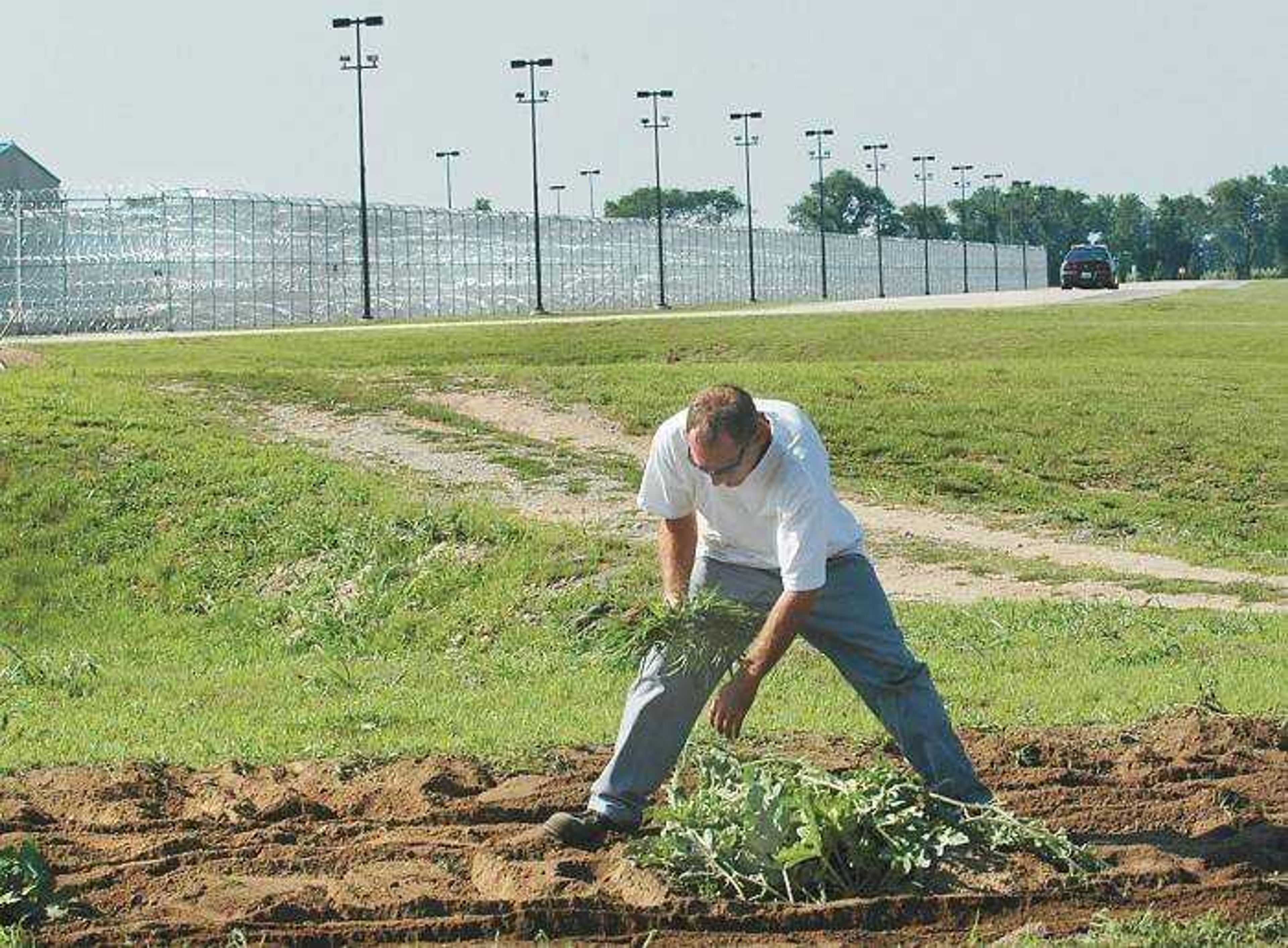Seeds of redemption
CHARLESTON, Mo. -- Darrell Porter toils away in a field each weekday. He tills soil, plants seeds, cuts grass, pulls weeds, harvests vegetables and picks fruit. But Porter isn't a farmer. He is a prisoner at Southeast Correctional Center...
~ A restorative justice initiative provides nutritious produce for area food banks.
CHARLESTON, Mo. -- Darrell Porter toils away in a field each weekday. He tills soil, plants seeds, cuts grass, pulls weeds, harvests vegetables and picks fruit.
But Porter isn't a farmer. He is a prisoner at Southeast Correctional Center.
The inmates at the prison grow a large-scale garden each year, and the fruits and vegetables produced end up in the hands of Southeast Missouri's poor.
While Porter is serving a sentence at the prison for committing second-degree robbery, he wanted to give something back to the community. The garden has become his chance to do that.
"You want to show that you're somewhat trying to redeem yourself for what you've done wrong," Porter said.
Every week, the produce is transported to the Bootheel Food Bank. The food bank distributes the food to 16 counties in Southeast Missouri through a coalition of churches, shelters, pantries, senior centers and other not-for-profit organizations.
"We're really thankful for the program," said Dorene Johnson, director of the Bootheel Food Bank. "It's nutritional food that many people can't afford."
The garden is an example of a Missouri Department of Corrections restorative justice initiative. The department's Web site describes these initiatives as opportunities for "offenders to reflect on the harm caused by their criminal activity and make restoration to victims, the community and their families."
In 1997, the Missouri House passed a bill authorizing restorative justice programs throughout Missouri penitentiaries. Brian Hauswirth, spokesman for the corrections department, said all 20 facilities run by the department have these programs, but only six have gardens.
Southeast Correctional Center's garden project began in 2002 after administrators searched for a restorative justice program tailored for their about 192 minimum security inmates. The prison took inspiration from Boonville Correctional Center in Boonville, Mo., which was the first Missouri prison to cultivate a restorative justice garden in 2001.
"Charleston has very good agricultural land that can accommodate this type of project," Hauswirth said.
Since 2002, Southeast Correctional Center has had two to four restorative justice programs each year.
Johnny Williams, who supervises work release offenders, works closely with the minimum-security inmates and selects garden workers. He said most of the men are volunteers who have a similar mindset to Porter -- they want to reach out to the community to repent for their wrongdoing.
Williams said the work may help them adjust to life after prison. "They're learning horticultural skills that they're going to be able to use when they're released," he said.
All of the seeds come from the Bootheel Food Bank, including corn, tomatoes, cabbage, cucumbers, watermelon, peppers, cantaloupe and zucchini.
And production has increased every year. The facility's agricultural site cultivated 46,000 pounds of produce in 2005. Steele said the prison will continue to try to increase the size and output of the garden each year.
The agricultural work also gives inmates a chance to blow steam and get fresh air. "It helps pass the time," said Erik Deprow, an inmate at the facility. "In there, there's really nothing to do. Out here, you got work every day."
Six to 10 inmates work from 8:30 a.m. to 3:30 p.m. each day. The tasks on hand are hard, but many workers don't mind.
"It feels good when you get back in and you're tired," Porter said. "You sleep the rest of the day."
Troy Steele, superintendent of Southeast Correctional Center, said the garden work is even harder during the summer when the heat index rises.
"The guys that just want to get out for a day don't make it long," Steele said. "The guys that aren't truly committed to the project, pardon the pun, get weeded out pretty quick because of the amount of effort."
Porter said some inmates choose to work because it helps keep them sane. When you lose the ability to work a real job due to being in prison, Porter said, sometimes you need an outlet for being productive.
"It's kind of like a full day's job out here," Porter said. "You get a little closer to freedom."
sludwig@semissourian.com
335-6611, extension 211
Connect with the Southeast Missourian Newsroom:
For corrections to this story or other insights for the editor, click here. To submit a letter to the editor, click here. To learn about the Southeast Missourian’s AI Policy, click here.










